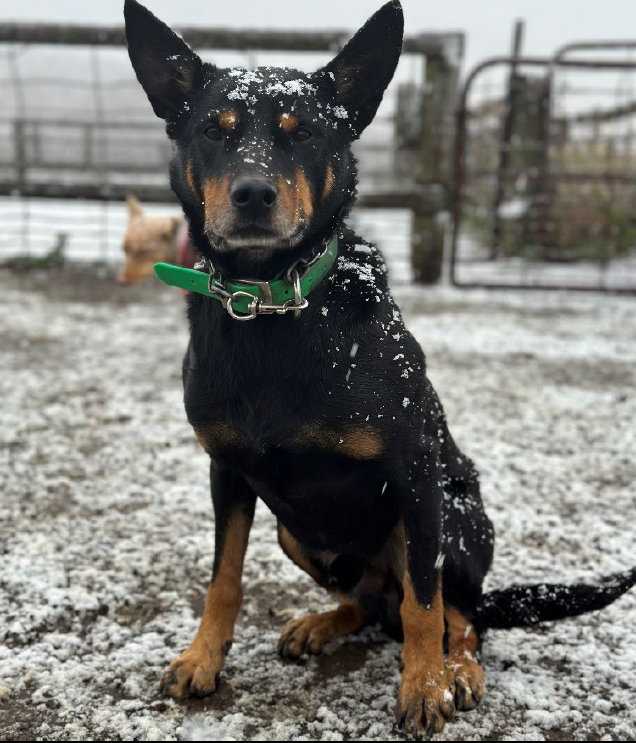Our Aussie winters aren’t always as cold as other parts of the world however, we still experience some extreme temperatures that can affect the wellbeing and performance of our working dogs. During the drop-in temperature over the winter months it is important to assess your dog’s health and performance throughout the season.
Dogs that are active several days a week, whether in the paddock or yard, cover a lot of ground and their physical condition will start to show. Ideally, they should appear fit and muscular, with a strong work ethic. However, the colder and wetter weather can pose challenges for working dogs, making it necessary to adjust their nutrition to keep them in top shape.
During cold and wet conditions, your working dog will use a lot of energy to stay warm, so it is crucial to provide them with a high-quality working dog food to support their activity. High intensity work can further increase their energy needs. It is recommended to feed them a highly digestible, high-energy food with a significant fat content, like Cobber Working Dog which contains everything your working dog requires to maintain their performance.
Fat not only serves as a source of energy, but it also acts as insulation against the cold. It is important to note that your working dog should not carry excess weight in the form of fat, but having a good fat layer can help them cope with the cold and wet conditions. If your dog has lost weight, consider increasing their food intake or switching to a more energy-dense food with higher fat content, such as Cobber Performance Dog which contains 20% fat. Fat is a highly concentrated source of energy, providing more calories per gram than protein or carbohydrates. This means that a smaller amount of fat-rich food is needed compared to food rich in protein or carbohydrates
Take care of your dog’s coat as well. In addition to maintaining good overall body condition, it is important to consider the condition of your dog’s coat and skin. Different breeds have different types of coats – some have double coats that provide insulation, while others have thinner, finer coats. The quality of your dog’s nutrition and the levels of fat in their diet can have a significant impact on the condition of their coat and skin. Omega fatty acids, such as omega 6 combined with zinc, which is found in Cobber diets, is particularly beneficial in enhancing coat health. Therefore, selecting the best food for working dogs is a crucial first step.
Even if it may not be your preference, it can be beneficial to use waterproof coats for your dog and drying coats at the end of the day. Waterproof dog coats, similar to horse rugs and can be helpful if your dog spends extended periods standing or waiting around. Not only do they keep your dog dry and warm for longer, they also help maintain the warmth of their hard-working muscles. Drying coats can also be useful after a long day or during breaks, preventing your dog from getting cold and shivering, which can waste their energy.
While it may seem counterintuitive, giving your dog a thorough wash or rinse after working in wet and muddy conditions can be very important practice. Removing excess mud can help maintain healthy skin and coat and provides an opportunity to check for injuries and remove any grass seeds or burrs.
General Winter Care Tips for Working Dogs:
Adjust Work Hours:
Whenever possible, schedule outdoor work for your dog during the warmer parts of the day to prevent them from getting too cold during prolonged exposure to the cold.
Provide Shelter:
Ensure your working dog has access to a sheltered area or kennel during breaks. A dry and insulated space allows them to rest and warm up, reducing the risk of hypothermia.
Nutritional Support:
Modify your dog’s diet during winter to meet their increased energy requirements. Consult with your vet to determine if they need additional calories or specific nutrients to maintain their health and stamina.
Remember, a happy and healthy working dog is a more effective and loyal partner in any task. By choosing Cobber, an Australian-made dog food, you can ensure that your dog is receiving a diet tailored to meet the nutritional needs of working dogs, allowing you to easily adjust their routine to provide necessary nutrients throughout the year.

For more information or to arrange a personalised consultation with a canine nutrition specialist, call the Ridley Customer Service Centre on 1300 666 657 or email us here.
By Jay Jayabalan, Canine Nutritionist – Ridley

